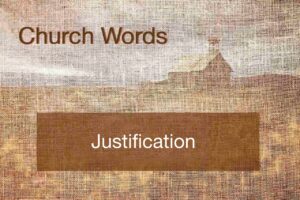 The old preacher wiped the sweat from his forehead with his clean, white handkerchief as he exclaimed, “I have been justified in God’s sight! It is just as if I’d never sinned.” Justification is God’s pardon of our sins and acceptance of us into his holy presence. The heart of the gospel message is that God forgives humankind’s sinful disobedience and saves, or justifies, those who have placed their faith in Jesus. Justification is the heart of the gospel. Martin Luther asserted, “It is the article by which the church stands or falls.” Evangelical Dictionary of Theology, ed. Walter A. Elwell, Grand Rapids: Baker Publishing, 2001, p. 643)
The old preacher wiped the sweat from his forehead with his clean, white handkerchief as he exclaimed, “I have been justified in God’s sight! It is just as if I’d never sinned.” Justification is God’s pardon of our sins and acceptance of us into his holy presence. The heart of the gospel message is that God forgives humankind’s sinful disobedience and saves, or justifies, those who have placed their faith in Jesus. Justification is the heart of the gospel. Martin Luther asserted, “It is the article by which the church stands or falls.” Evangelical Dictionary of Theology, ed. Walter A. Elwell, Grand Rapids: Baker Publishing, 2001, p. 643)
Justification is an act of God’s grace. We cannot earn it. We need only freely accept what God longs to give. The concept of justification was first introduced in Mosaic law. The priest was instructed in the procedures to be followed in sacrificing an animal to atone for his sins and the sins of God’s people. The most vivid example was the Day of Atonement, or Yom Kippur (Leviticus 23:27-28), which, in Old Testament times, involved a bull and two goats. The bull was sacrificed for the sins of the priest and his household. One goat paid the ultimate price for the people’s sin as a sacrifice. The other, the “scapegoat,” had the people’s sins symbolically placed on its head. It was then sent out into the wilderness to signify the removal of sin from God’s sight. (Leviticus 16:1-34) But that removal, or atonement, was only temporary—until the next transgression. “So then, the law was our guardian until Christ came, in order that we might be justified by faith” (Galatians 3:24 | ESV).
No Condemnation
Justification is actually “a forensic term, denoting a judicial act of administering the law—in this case, by declaring a verdict of acquittal and so excluding all possibility of condemnation.” (Elwell) “Therefore, there is now no condemnation for those who are in Christ Jesus . . .” (Romans 8:1). When Jesus came the rules changed. But, the shedding of blood was still required. “Indeed, under the law almost everything is purified with blood, and without the shedding of blood there is no forgiveness of sins” (Hebrews 9:22 | ESV). Unlike the animal sacrifice, however, the blood of Jesus removes sin’s consequences forever. To explain what it means, the apostle Paul articulated what became known as the Doctrine of Justification by Faith. His thesis is God’s law never changed, but Jesus has fulfilled its requirements.
Jesus proclaimed, “Do not think that I have come to abolish the Law or the Prophets; I have not come to abolish them but to fulfill them” (Matthew 5:17 | NIV). As a result of Jesus’s death and resurrection, we have a righteousness that we could never attain on our own. We are clothed in the righteousness of Jesus, which results from our faith in him. Faith, alone, justifies us. Jesus, plus nothing, makes us holy in God’s eyes. God does not see a sinful person when he sees a genuine disciple. He sees only Jesus. “Since we have now been justified by his blood, how much more shall we be saved from God’s wrath through him!”(Romans 5:9 | NIV) On Calvary’s cross, Jesus experienced God’s total hatred of and just punishment for sin. The disciple’s sin bill has been marked “paid in full.”
